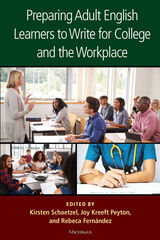2 books about Preparing Adult English Learners

Preparing Adult English Learners to Read for College and the Workplace
Edited by Kirsten Schaetzel, Joy Kreeft Peyton, and Rebeca Fernández
University of Michigan Press, 2024
The ability to read effectively—to work with a text, understand its meaning, and talk and write about it with, and for, others—is a critical aspect of academic and workplace success. However, many adults who are learning English as a second or additional language do not have the skills needed to be successful and may drop out of college and university programs before they reach their goal. Bringing together a rich collection of topics and authors, this edited volume provides theory, research, and instructional approaches to help adult education ESL practitioners work effectively with adult learners and prepare them to be successful with reading in academic and workplace settings.
After reading this book, adult ESL practitioners will be able to
After reading this book, adult ESL practitioners will be able to
- Prepare adults learning English to apply appropriate reading strategies to a variety of academic and professional contexts and purposes
- Use instructional strategies, including digital technology, to help struggling and developing readers close gaps in skills and conceptual knowledge
- Improve reading comprehension through robust vocabulary instruction
- Enhance reading skills and comprehension through writing instruction that balances sentence-level, discourse, and interactive processes and practices
- Inspire students to become lifelong readers who engage in extensive reading outside of school and professional contexts
[more]

Preparing Adult English Learners to Write for College and the Workplace
Kirsten Schaetzel, Joy Kreeft Peyton, and Rebeca Fernández
University of Michigan Press, 2019
This volume has been written as a response to the new types of communicative demands that the twenty-first century has brought to the workplace. Today’s adult education programs must prepare students to understand complex operations, be problem-solvers, be computer literate, and be fluent in professional English when speaking and writing. As a result, writing has become a bigger need in the field of adult education, and writing instruction must follow suit and extend beyond transactional writing (taking notes, correcting grammar, writing narratives) to rhetorically flexible writing for multiple audiences, purposes, and contexts, whether for a college course or in the workplace. Some of the specific types of writing students need now are the ability to: write argumentative, technical, and informative texts; create, argue for, and support a thesis statement; summarize; write concisely with appropriate vocabulary; produce a well-edited piece understandable to native speakers; and use and credit sources.
The volume is organized into four parts: Setting the Stage for Teaching Writing, Supporting the Writing Process, Working with Beginning Writers, and Aligning Writing with Accountability Systems. Chapters are written by current (or former) adult educators with experience across levels. Each chapter introduces an approach based on research that can guide writing instruction and provides specific guidance and tools for implementation. Questions open and close the chapters to guide reading and frame future exploration. JoAnn (Jodi) Crandall has written the Epilogue.
Readers will discover ways to move adults into higher education and careers by helping them be college and career ready, to integrate writing into the existing curriculum in adult education programs at all levels, including content classes, and to teach writing according to national and state standards.
The volume is organized into four parts: Setting the Stage for Teaching Writing, Supporting the Writing Process, Working with Beginning Writers, and Aligning Writing with Accountability Systems. Chapters are written by current (or former) adult educators with experience across levels. Each chapter introduces an approach based on research that can guide writing instruction and provides specific guidance and tools for implementation. Questions open and close the chapters to guide reading and frame future exploration. JoAnn (Jodi) Crandall has written the Epilogue.
Readers will discover ways to move adults into higher education and careers by helping them be college and career ready, to integrate writing into the existing curriculum in adult education programs at all levels, including content classes, and to teach writing according to national and state standards.
[more]
READERS
Browse our collection.
PUBLISHERS
See BiblioVault's publisher services.
STUDENT SERVICES
Files for college accessibility offices.
UChicago Accessibility Resources
home | accessibility | search | about | contact us
BiblioVault ® 2001 - 2024
The University of Chicago Press









